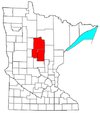2010 census
As of the census of 2010, there were 7,610 people, 2,963 households, and 2,110 families living in the city. The population density was 413.8 inhabitants per square mile (159.8/km2). There were 3,176 housing units at an average density of 172.7 per square mile (66.7/km2). The racial makeup of the city was 96.5% White, 0.5% African American, 0.5% Native American, 0.9% Asian, 0.1% Pacific Islander, 0.2% from other races, and 1.4% from two or more races. Hispanic or Latino of any race were 1.1% of the population.
There were 2,963 households, of which 35.8% had children under the age of 18 living with them, 59.5% were married couples living together, 7.6% had a female householder with no husband present, 4.1% had a male householder with no wife present, and 28.8% were non-families. 23.8% of all households were made up of individuals, and 11.8% had someone living alone who was 65 years of age or older. The average household size was 2.55 and the average family size was 3.02.
The median age in the city was 38.7 years. 27% of residents were under the age of 18; 7.7% were between the ages of 18 and 24; 23.8% were from 25 to 44; 25.6% were from 45 to 64; and 15.8% were 65 years of age or older. The gender makeup of the city was 48.3% male and 51.7% female.
2000 census
As of the census of 2000, there were 5,555 people, 1,921 households, and 1,586 families living in the city. The population density was 320.7 inhabitants per square mile (123.8/km2). There were 1,979 housing units at an average density of 114.3 per square mile (44.1/km2). The racial makeup of the city was 98.63% White, 0.02% African American, 0.22% Native American, 0.41% Asian, 0.09% from other races, and 0.63% from two or more races. Hispanic or Latino of any race were 0.61% of the population. 31.8% were of German, 14.0% Norwegian, 11.3% Swedish, 6.4% Irish and 5.0% English ancestry.
There were 1,921 households, out of which 45.1% had children under the age of 18 living with them, 72.4% were married couples living together, 8.0% had a female householder with no husband present, and 17.4% were non-families. 14.2% of all households were made up of individuals, and 6.1% had someone living alone who was 65 years of age or older. The average household size was 2.87 and the average family size was 3.17.
In the city, the population was spread out, with 31.7% under the age of 18, 6.5% from 18 to 24, 28.6% from 25 to 44, 22.8% from 45 to 64, and 10.4% who were 65 years of age or older. The median age was 36 years. For every 100 females, there were 95.9 males. For every 100 females age 18 and over, there were 90.7 males.
The median income for a household in the city was $52,289, and the median income for a family was $55,838. Males had a median income of $38,375 versus $26,667 for females. The per capita income for the city was $19,772. About 2.3% of families and 5.0% of the population were below the poverty line, including 5.9% of those under age 18 and 3.7% of those age 65 or over.


